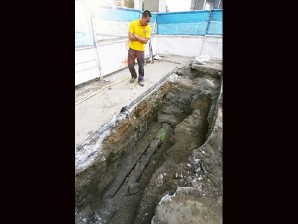MANILA, Philippines—Several measures have been put in place to ensure the safety of an oil pipeline that had been shut after it leaked underneath a condominium in Makati City, the head engineer of the First Philippine Industrial Corporation (FPIC) told the Court of Appeals.
Einstein Chiu, head engineer in FPIC Technical Services Department, together with Ireneo Raule Jr., senior vice president of FPIC and head of the company’s Operations and Maintenance Division, said several measures have been undertaken to ensure the safety of the white oil pipeline.
The Court of Appeals is hearing the writ of kalikasan filed by residents of the West Tower Condominium before the Supreme Court. The high court temporarily lifted the writ of kalikasan it issued against the white oil pipeline (WOPL) of the FPIC to allow the conduct of leak tests that would determine the structural integrity of the pipeline. After the tests, the pipeline was closed again for operation.
The WOPL, which extends 117 kilometers from Batangas province to Manila’s Pandacan district, leaked near the West Tower Condominum in Makati City. It was unilaterally closed by FPIC on October 27, 2010, a month before the high court issued the TEPO.
The high court sent the case to the Court of Appeals for further hearing to determine if the pipeline would be closed permanently or be allowed to operate.
Before the appellate court, Raule enumerated the measures undertaken by the company to enhance the integrity of the WOPL. They include:
• Conducting in-line inspection tests using technically advanced tools (known in the industry as “smart pigs”) to discover any pipeline wall loss that would be the result of corrosion or other causes;
• Ensuring that an anti-corrosion system is in place;
• Conducting regular cleaning scraper runs through the pipeline, which clears the pipeline of any debris, product build-up and deposits, or any possible obstructions in the internal surface of the pipeline;
• Putting up above-ground warning signs and markers along the pipeline to let the public know where it is;
• Conducting daily patrols along the pipeline route to prevent unauthorized diggings;
• Coordinating regularly with local governments, the Department of Public Works, the Metropolitan Manila Development Authority and utility companies to ensure the safety of the pipeline.
Court of Appeals Associate Justice Fernanda Lampas-Peralta has set a May 20 deadline for the appeals court to resolve whether it will allow the reopening of the pipeline or not.
Prior to its closure, the pipeline supplied more than 50 percent of the petroleum products for the oil depot in Pandacan, Manila, considered as the largest and most important depot in the country.
The depot supplies to 459 fuel dealers in Metro Manila and about 1,800 gas stations from Regions 1 to 4.
